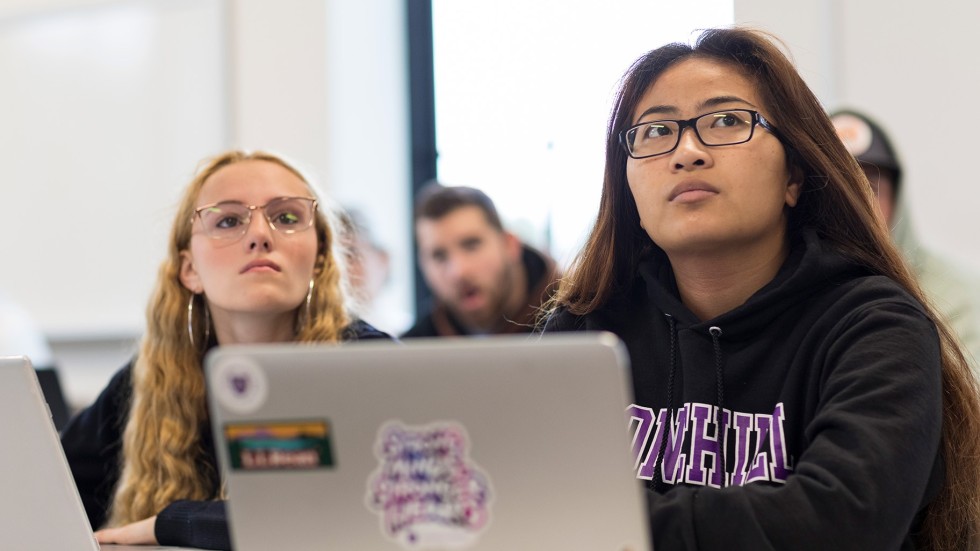Skyhawk Core Curriculum
A flexible foundation for building your future.

The Skyhawk Core Curriculum fosters inquiry, exploration, and discovery, anchored in the Holy Cross Catholic social justice tradition of compassion and concern for the dignity and welfare of every person. With a flexible foundation in the liberal arts, our students partner with a team of faculty and advisors to develop the skills, knowledge, and character to think, act, and lead with the courage to help create a more just and compassionate world.
Education Foundation
The Stonehill Skyhawk Core Curriculum is comprised of four foundational dimensions:
- Writing
Writing is central to a Stonehill education. Stonehill’s writing courses enable students to think through and explain complicated materials clearly and persuasively, developing strong arguments and powerful narratives. - Ways of Knowing: Sciences and Humanities
A key aspect of the Skyhawk Core Curriculum consists of courses in the sciences and humanities. Ways-of-Knowing courses raise essential human questions and provide social, historical, and scientific contexts for making sense of the world around us. - Mission: Justice and Compassion
At the heart of our curriculum stands our commitment to the inherent dignity of each person and to the creation of a more just and compassionate world. Mission courses help students wrestle with questions about justice, injustice, compassion, and cruelty, how to think creatively and critically about them, and to discover the resources that are available within our world’s deep ethical and religious traditions. - Capstone
The Stonehill academic experience culminates in an integrative capstone project or experience, tailored to the individual student’s major, goals, and interests.
Recommended Course Sequencing and Guidelines
First Year
First Year Writing Seminar focuses on learning to write clearly and persuasively in small classes organized around engaging themes. [WRITING]
Language, Arts, and Humanities courses explore the deepest human concerns and ideas through the lenses of art, literature, language, philosophy, and religion.
First Year or Sophomore Year
Differences, Perspectives, and Reflection courses examine the role of power and privilege in shaping societal inequities and individual perspectives. [MISSION].
History and Social Science courses focus on human behavior and interactions, institutions and social groups, and ideas and ideologies in the past and present. [WAYS OF KNOWING].
Language, Arts, and Humanities courses explore the deepest human concerns and ideas through the lenses of art, literature, language, philosophy, and religion.
Sophomore Year
Catholic Thought and Action courses focus on the role and insights of Catholic thinkers and Biblical traditions. [MISSION]
Sophomore or Junior Year
Writing in the Disciplines, fulfilled within a student’s major, introduces students to the stylistic and scholarly conventions of their major discipline. [WRITING]
Junior Year
Quantitative Reasoning courses explore the plurality of ways in which human beings think about what is right and wrong and just and unjust. [MISSION]
Any Year
Global Perspectives courses courses explore world views, cultures, and/or languages that are different from the dominant US/English-speaking culture. [WAYS OF KNOWING]
History and Social Science courses focus on human behavior and interactions, institutions and social groups, and ideas and ideologies in the past and present. [WAYS OF KNOWING]
Language, Arts, and Humanities courses explore the deepest human concerns and ideas through the lenses of art, literature, language, philosophy, and religion. [WAYS OF KNOWING]
Natural Science and Physical Science courses explore the natural world and scientific methods and theories. [WAYS OF KNOWING]
Statistical Reasoning courses help students understand, interpret, evaluate, and organize quantitative and statistical data. [WAYS OF KNOWING]
Senior Year
Capstone projects or courses are opportunities for students to deepen and extend their knowledge, individual interests, and skills, as they continue to build and shape their futures. [CAPSTONE]
Contact Information
The Registrar's Office works to safeguard the accuracy, integrity, confidentiality and security of the student information system and of students' academic records; and to provide the accurate and timely dissemination of course and scheduling information.